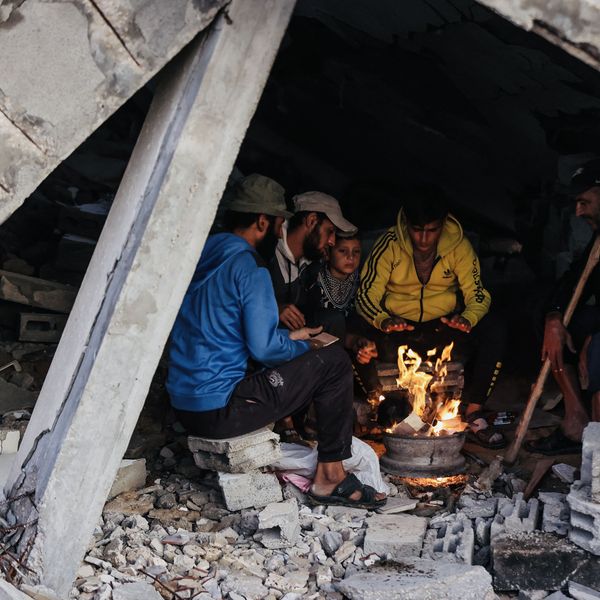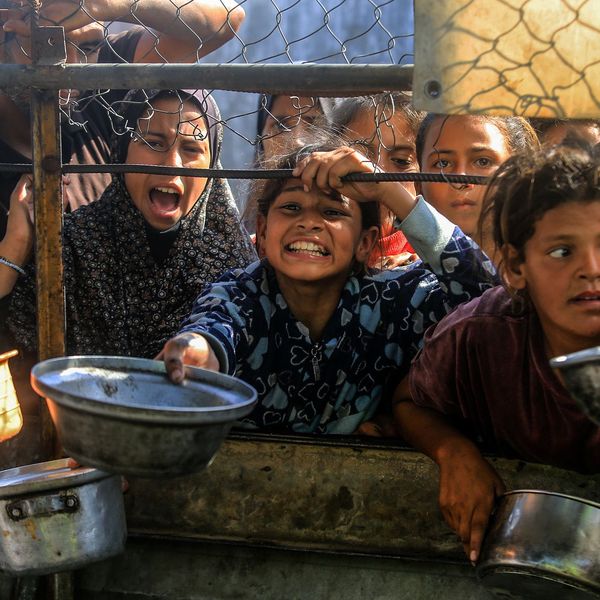Israel has always had issues with space, displacing Palestinian populations and carving out new settlements. Now, a growing migrant population has evoked a fresh wave of xenophobic rage. Last month, Tel Aviv was the site of rabid attacks on shops and residents in African migrant communities.
CNN reported:
Israeli protesters chanted slogans such as "infiltrators get out" and "Tel Aviv: A refugee camp". Three members of the right wing Likud party--part of the governing coalition--were among the politicians who attended. One of them, Miri Regev, was quoted as saying that "the Sudanese are like a cancer in society."
Amin, an Eritrean migrant whose business, a local bar, was destroyed by rioters, told the Jerusalem Post in bewilderment, "They just smashed the place up. They destroyed everything. Why? What for? What have we done to them?"
In this nation built by refugees of war and genocide, the protesters seemed oblivious to the historical refraction of this display of mob terror and smashed glass.In this nation built by refugees of war and genocide, the protesters seemed oblivious to the historical refraction of this display of mob terror and smashed glass. If anything, their hatred for migrants living and working among them resonated with bigotry overseas, particularly anti-Latino jingoist campaigns in the United States.
Haaretz quoted a shoe seller in the Hatikva neighborhood who seemed inspired by America's legacy of racism.
"It will become Harlem here," Kuzarov warned. "You walk here on Shabbat and you don't see anyone our color. This was the happiest place in the world; now it's become a black grave."
For besieged migrant communities, the state of Israel has become a dead end for human rights. Since citizenship is linked to racialized religious identity, the typical migrant is the ultimate Other, to be vilified as pariahs, or exploited for cheap labor. Like other immigrants to richer nations, Israel's migrants often work in low-wage sectors with minimal protection from abuse. Meanwhile, many refugees from Sudan and Eritrea are trapped in a legal limbo and technically barred from working. The recent anti-migrant violence also appears to be partly incited by sexual assault accusations involving African migrants.
Michal Schwartz of Workers Advice Center, a Tel Aviv-based independent trade union, said via email that the recent influx of African migrants are fleeing war and poverty only to encounter more crippling oppression in a nation that refuses to recognize their humanity:
Most of them just seek work, escaping areas that are subject to famine and tyrannical regimes. Because Israel does not know what to do with them, some are thrown to detention camps, the rest are picked up by Israeli police or border police, and then put on a bus to Tel Aviv and dumped in poor Jewish neighborhoods, living in extremely poor conditions and without ... the right to work.
The backdrop to the anti-migrant attacks is a social and legal structure based on segregation, despite the veneer of liberal democracy. Schwartz added, "The problem here is not that the African immigrants compete with the natives who attacked them for work." While the attackers may have been poor, she argued, they "are not part of the labor movement. They throw their frustration on those weaker than them, with darker skins, after being incited by 'professional' racists. Those same people could easily attack Palestinians if they had a chance to."
The backdrop to the anti-migrant attacks is a social and legal structure based on segregation, despite the veneer of liberal democracy. The exclusion policies targeting migrant "infiltrators" derive from the apartheid regime buttressing the state's foundation.
Even those migrants who enter legally as guestworkers suffer deep discrimination. According to a Human Rights Watch commentary, workers who are "bound" to their employers are exposed to extreme coercion:
As with the "sponsorship" or kifala system of many other Middle Eastern countries, Israeli policies make foreign workers extremely vulnerable to exploitation. In 2006, Israel's Supreme Court found that the "binding" policy "has created quasi, modern-version slavery" where "the foreign worker had become a serf of this employer," and gave the government six months to cancel it.
Four years on, it hasn't.
Other policies, purportedly to discourage foreign workers from any activity that could strengthen their claims to Israeli residency, make it impossible for many foreign workers to have any form of family life.
Yet these migrants are cogs in a broader campaign to marginalize Palestinian workers, HRW noted. Foreign workers were recruited "as Israel has sought to replace the Palestinian work force since the second intifada, or uprising, began in 2000."
Israeli President Benjamin Netanyahu recently complemented the street violence with a brutal decree to deport some 25,000 "infiltrators," stating that "Whoever can be sent away should be sent away from here as quickly as possible." The measure will immediately affect migrants from countries with which Israel has diplomatic relations that allow for repatriation. A larger number of migrants hail from Eritrea and Sudan, to where deportation is impossible due to humanitarian concerns.
The government's reaction to the immigration crisis mirrors its approach to "managing" Palestinians: military patrols and border walls--recently embodied in the planned construction of a massive steel fence to enforce the Egypt-Israel border.
Though fears about economic competition are colored by racist paranoia, immigration is fundamentally an economic justice issue, for the migrants and for all of Israel's fractured society. Israeli law has linked together African migrants, Arab Israelis and Palestinians in the Occupied Territories in a permanent underclass--branded as criminal infiltrators, security threats or enemies in their own homeland. Meanwhile, neoliberal economic policies exacerbate entrenched racial and class inequalities, including underlying economic instability among Israeli citizens.
"As long as Israel continues to sanctify the principle of a Jewish majority," Schwartz said, "its policy remains racist both to the Palestinians in the occupied territories, to the Arab citizens in Israel, and to the migrants."
Amid fences and checkpoints, Israel is infused with an explosive amalgam of economic stratification and race nationalism. The violence unleashed against migrants last month was just one of many sparks dancing around a short fuse with a long history.

